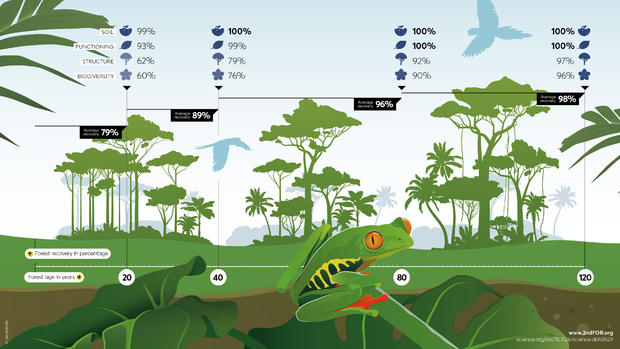Destroyed tropical forests could almost fully regrow if humans leave them alone for 20 years, study says
Tropical forests, a vital home to animal life and slowing down global warming, continue to disappear at an alarming rate. But a new study found that there is hope for already destroyed forests to almost fully regrow — if humans leave them alone.
The study, published in the journal Science on Thursday, analyzed 77 different forest sites across the tropics that have been abandoned after deforestation. When left alone by people for 20 years, scientists found, the forests can regain an average 78% of their original growth.
Old-growth forests — those that have remained without significant disturbance — are rich in biodiversity, as their durability and stability allow numerous plant and animal species to thrive. But because of climate change and human interaction, these unburdened forests have become rarer.
In March, Rainforest Foundation Norway found that humans are largely responsible for the destruction and degradation of nearly two-thirds of Earth's tropical rainforests. Agriculture, energy consumption, international trade and the production of soy, palm oil, cattle, logging and mining are the largest threats to these ecosystems.
Wageningen University ecology professor Lourens Poorter, the lead author of the new forest study, said there are few old-growth forests left in the world, making it "essential" to stop further deforestation.
"These regrowing forests cover vast areas, and can contribute to local and global targets for ecosystem restoration," Poorter said. "They provide global benefits for climate change mitigation and adaptation and biodiversity conservation, and many other services for local people, such as water, fuel, wood, and non-timber forest products."
Poorter and others on their team looked at recovering forests across the Americas and West Africa, specifically looking at how soil, plant function, species diversity and species composition changed over time with different levels of human interference.
Some of those attributes can heal quicker than others. When left alone, soil can almost fully recover in less than a decade, while plant function can nearly fully recover within 25 years. The diversity and composition of species take the longest to reach an almost complete recovery, taking up to 60 years and at least 12 decades, respectively.
Their findings show that not all aspects of climate change mitigation and environmental restoration need to be expensive. The simple act of leaving the areas alone to heal is a "low-cost, natural solution" to ease many of the issues that have arisen over the years, the study says.
This could prove vital as part of the United Nations' goals to protect, restore and promote sustainability and reverse land degradation. The U.N. says forest ecosystems are vital to life on Earth, as they help offset global warming, provide 76 million tons of food worldwide, are home to 80% of all land-based species, and provide 75% of the world's accessible freshwater.
"Tropical forests recover surprisingly fast on abandoned lands," Poorter tweeted about the study. "Naturally regrowing forests are therefore a low-cost, #naturebasedsolution...and provide tangible benefits at the short term."




